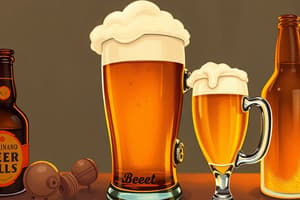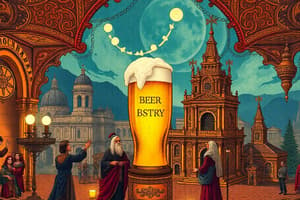Podcast
Questions and Answers
What is the oldest chemically confirmed evidence of beer production?
What is the oldest chemically confirmed evidence of beer production?
- 7,000 years ago in Iran (correct)
- 5,000 years ago in Europe
- 3,900 years ago in Mesopotamia
- 15th century in England
What was the precursor to beer?
What was the precursor to beer?
- Boiling herbs in water
- Distilling wine
- Soaking grains in water (correct)
- Fermenting fruit juice
What was the daily ration of beer given to workers constructing the Great Pyramids in Giza?
What was the daily ration of beer given to workers constructing the Great Pyramids in Giza?
- 2-3 liters
- 4-5 liters (correct)
- 3-4 liters
- 1-2 liters
When were hops introduced to the brewing process?
When were hops introduced to the brewing process?
What is the Reinheitsgebot?
What is the Reinheitsgebot?
Who discovered the role of yeast in fermentation?
Who discovered the role of yeast in fermentation?
What is the technique of continuous fermentation?
What is the technique of continuous fermentation?
What were brown bottles introduced for?
What were brown bottles introduced for?
What is the etymology of the word 'beer'?
What is the etymology of the word 'beer'?
Flashcards
What is Beer?
What is Beer?
One of the oldest drinks produced by humans, dating back to the 5th millennium BC.
What is Gruit?
What is Gruit?
A mix of various herbs used to flavor beer before hops.
What is the Reinheitsgebot?
What is the Reinheitsgebot?
Introduced in Bavaria in 1516, it limited beer ingredients to water, barley, and hops (later yeast).
Who is Louis Pasteur?
Who is Louis Pasteur?
Signup and view all the flashcards
Who is Morton Coutts?
Who is Morton Coutts?
Signup and view all the flashcards
Who is Ægir?
Who is Ægir?
Signup and view all the flashcards
Who is Ninkasi?
Who is Ninkasi?
Signup and view all the flashcards
The word 'beer'
The word 'beer'
Signup and view all the flashcards
Spanish/Portuguese word for beer
Spanish/Portuguese word for beer
Signup and view all the flashcards
Study Notes
History of Beer and Brewing
-
Beer is one of the oldest drinks humans have produced, with the first chemically confirmed barley beer dating back to the 5th millennium BC in modern-day Iran.
-
Beer-like drinks were independently developed throughout the world soon after a tribe or culture had domesticated cereal, with chemical tests of ancient pottery jars revealing beer production as far back as about 7,000 years ago in what is today Iran.
-
The discovery of beer may have been an accidental find, with the precursor to beer being soaking grains in water and making a porridge or gruel.
-
The oldest evidence of beer in Mesopotamia is believed to be a 6,000-year-old Sumerian tablet depicting people consuming a drink through reed straws from a communal bowl, with the oldest surviving beer recipe dating back to 3,900 years ago.
-
Beer was known in Neolithic Europe as far back as 5,000 years ago and was mainly brewed on a domestic scale.
-
During the Industrial Revolution, the production of beer moved from artisanal manufacture to industrial manufacture, and domestic manufacture ceased to be significant by the end of the 19th century.
-
Today, the brewing industry is a global business, consisting of several dominant multinational companies and many thousands of smaller producers ranging from brewpubs to regional breweries, with more than 133 billion liters (35 billion gallons) sold per year producing total global revenues of $294.5 billion (£147.7 billion) in 2006.
-
Ancient Nubians used beer as an antibiotic medicine.
-
Clay tablets indicate that the majority of brewers in ancient Mesopotamia were probably women, and brewing was a well-respected occupation.
-
Beer was part of the daily diet of Egyptian pharaohs over 5,000 years ago, and each worker constructing the Great Pyramids in Giza was given a daily ration of four to five liters of beer.
-
Beer was one of the most common drinks during the Middle Ages, consumed daily by all social classes in the northern and eastern parts of Europe where grape cultivation was difficult or impossible.
-
The use of hops in beer was written of in 822 by the Carolingian Abbot Adalard of Corbie, but it was only gradually adopted because of difficulties in establishing the right proportions of ingredients. Before that, gruit, a mix of various herbs, had been used.A Brief History of Beer
-
English ale and beer brewing were carried out separately until the 15th century.
-
Hops were introduced to the brewing process in northern Germany in the 13th century, which improved the brewing process and the quality of beer.
-
The Reinheitsgebot (purity law) was introduced in Bavaria in 1516, limiting beer ingredients to water, barley, and hops (later adding yeast).
-
Louis Pasteur discovered the role of yeast in fermentation in 1857.
-
Brown bottles were introduced in 1912 to prevent harmful rays from destroying the quality and stability of beer.
-
Some European countries have unbroken brewing traditions dating back to ancient times.
-
Morton Coutts developed the technique of continuous fermentation in 1953.
-
Traditional brewing techniques protect beer from oxidation by maintaining a carbon dioxide blanket over the wort.
-
Modern breweries produce many types of beer, ranging from ancient styles to new modern American creations.
-
Prior to Prohibition, there were thousands of breweries in the United States, mostly brewing heavier beers than modern US beer drinkers are used to.
-
Consolidation of breweries and the application of industrial quality control standards have resulted in mass-production and mass-marketing of huge quantities of light lagers.
-
Mythology surrounding beer includes Flemish king Gambrinus being credited with the invention of beer, deity Radegast inventing beer according to Czech legend, and Ninkasi being the patron goddess of brewing in ancient Sumer.The Origins and Etymology of Beer
-
In Norse mythology, the sea god Ægir brewed ale for the gods, and his hall had magical cups that refilled themselves.
-
Satanaya, the mother of the Narts in Nart sagas, was said to have invented beer.
-
Irish mythology attributes the invention of beer to Charlie Mops.
-
The word "beer" comes from old Germanic languages and was imported to the British Isles by tribes such as the Saxons.
-
The word "beer" has variations in continental Germanic languages, but not in Nordic languages.
-
Many other languages, such as French, Italian, Romanian, and Turkish, have borrowed the Dutch/German word for beer.
-
The Nordic languages use "öl/øl," which is related to the English word "ale."
-
Spanish, Portuguese, and Catalan have words that evolved from the Latin "cervisia," originally of Celtic origin.
-
Slavic languages use "pivo," based on a pre-Slavic word meaning "drink" and derived from the verb meaning "to drink."
-
The Chuvash "pora" is the r-Turkic counterpart to the Germanic beer-word.
-
The etymology of the word "beer" is disputed.
-
No sources are provided for this short text.
Studying That Suits You
Use AI to generate personalized quizzes and flashcards to suit your learning preferences.




